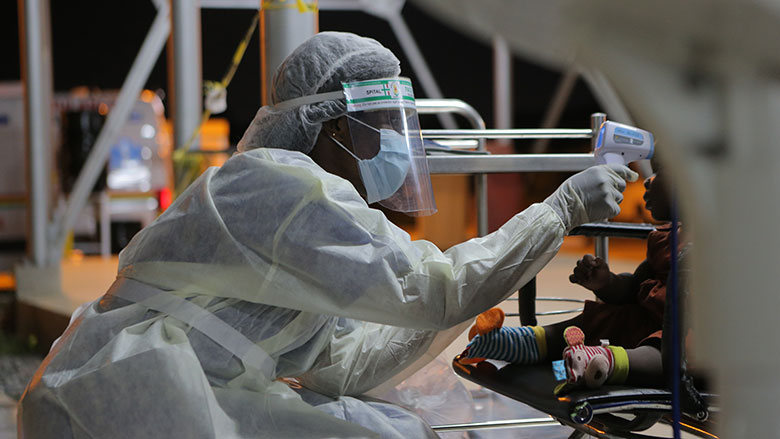
By Christine Awor
The outbreak of the COVID-19 pandemic has had far-reaching consequences on various aspects of society, including the provision of essential health services in Africa. The continent has faced significant challenges in maintaining and delivering crucial healthcare services to its population due to the disruptions caused by the pandemic.
Researchers across the board conducted qualitative studies in selected regions of Ghana. The study was conducted in Greater Accra, Ashanti, Oti, Northern and Western regions of Ghana. Greater Accra, Ashanti, and Western regions were representative of regions that recorded high cases of COVID-19 while Oti and Northern regions recorded low cases of COVID-19.
The research paper titled, “Maintaining essential health services during COVID-19 in Ghana: a qualitative study,” features front-line healthcare workers, policy-makers, or other stakeholders who worked during the COVID-19 pandemic in regions with either low or high recorded COVID-19 cases.
The health researchers from were from Makerere University School of Public Health (Uganda), University of Ghana, and the University of Professional Studies, Legon, Ghana.
The researchers comprised; Isaac Yeboah (Employment and Society, University of Professional Studies, Legon, Ghana), Duah Dwomoh, Fidelia Ohemeng, Sylvia Akpene Takyi, Ibrahim Issah, Serwaa Akoto Bawuah, and Julius Fobil from University of Ghana, Legon, Ghana, and Rhoda Kitti Wanyenze, Rawlance Ndejjo, Steven Ndugwa Kabwama from Makerere University School of Public Health, Uganda.
These researchers explored recognizing barriers and adapting innovative measures for future pandemic responses. They noted that in Ghana, the COVID-19 pandemic has led to disruptions in essential health services, including maternal, reproductive, and child health services, communicable and non-communicable disease care, and elective surgeries but it has also provided an opportunity for improvement and enhancement in the delivery of healthcare.
The disruption of these essential health services, however, also presented an opportunity for health authorities in Ghana to improve the continuous access to these services and enhance the quality of health service delivery. According to the study, in response to the challenges posed by the pandemic, health facilities in Ghana implemented innovative solutions such as telemedicine and mobile health clinics to ensure that patients could still access care remotely.
“High-COVID-19 regions used telemedicine for remote consultations, triage, preventive care, and ongoing health management, ensuring essential service continuity.” they asserted.
This not only helped to reduce the risk of COVID-19 transmission but also improved the overall accessibility of health services for individuals who may have difficulty accessing traditional healthcare facilities.
“Yes, I would say telehealth, because we used a lot of telehealth, especially when we had the waves. People in Accra were [e-meeting] with people who were in Bolga, Tamale, and other places. We used a lot of video conferences and health education [tools].” (KII2–National COVID-19 Taskforce)
The researchers also noted that the disruption of essential health services during COVID-19 prompted health authorities in Ghana to re-evaluate and streamline their service delivery processes. This led to the implementation of new protocols and guidelines to ensure the safety of both patients and healthcare workers, as well as the adoption of new technologies to improve the efficiency and effectiveness of healthcare delivery.
These changes have not only helped to mitigate the impact of the pandemic on essential health services but have also resulted in long-term improvements in the quality of care provided to patients in Ghana.
“In order not to be crowded at the health facility and increase the risk of infection, health facilities were running a staff rotation (shift) system. This system allowed for fewer nurses in the facility at a time. This was implemented across regions with low and high cases of COVID-19.” The study reads in part.
The study shows that home-based care, prioritized in high-case regions, minimized COVID-19 spread, addressed transportation issues, preserved healthcare resources, and provided personalized services among other measures in place. As part of efforts to provide home-based care services, communities were engaged and educated on the risks, modes of transmission, and protective behaviors against the COVID-19 disease. This approach strengthens community resilience and encourages early interventions
“But you know, when you go to the field, sometimes, some of the clients are hesitant to come forward for health care. But we kept on giving them health education by telling them the risks, the modes of transmission, and what they could do to protect themselves, even though they could still have good access to our services.” (Frontline Health Worker, Ashanti Region).
The study suggests that essential healthcare services must be prioritized in planning and responding to future pandemics to minimize healthcare system shocks. They urge the government of Ghana through the Ghana Health Service to build resilient health facilities by strengthening health facility readiness and preparedness for pandemic response and also set up emergency funds to respond to future pandemics.
“We recommend mixed-methods evaluations of population-based interventions at various sub-levels of the population and health system to inform policy and practice.” The study reveals.
In the whole, the disruption of essential health services during COVID-19 in Ghana has been a catalyst for positive change in the healthcare system. By adapting to the challenges posed by the pandemic, Ghana has been able to improve access to essential health services and enhance the quality of healthcare delivery as shown in the study. This transformation is a testament to the resilience and innovation of the Ghanaian healthcare sector and serves as a model for other countries facing similar challenges.
Photo Caption | Health workers wearing personal protective gear at the Ga East District Hospital, working tirelessly day and night to save lives. Photo: Rodney Quarcoo, World Bank.
Please find the scientific article here.

